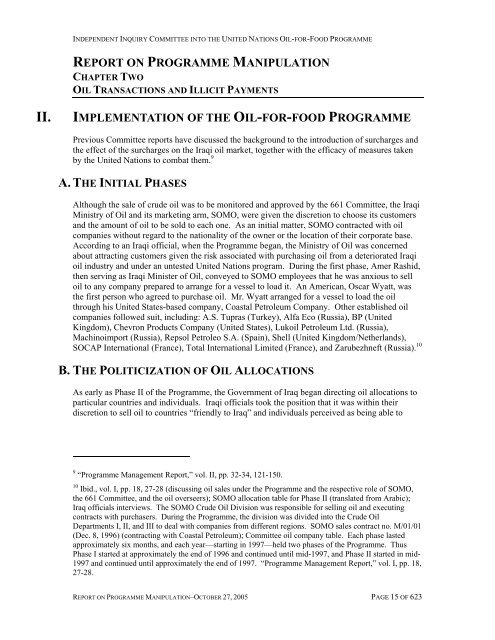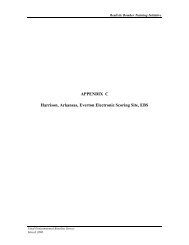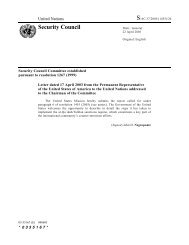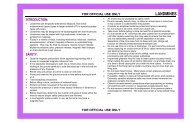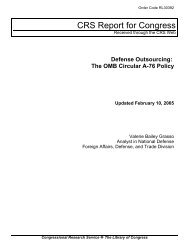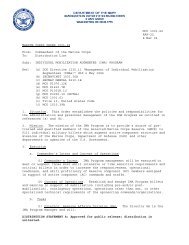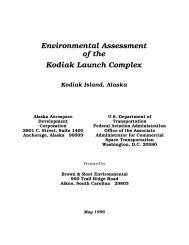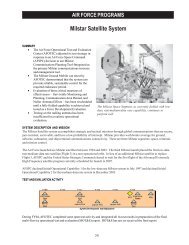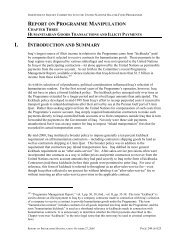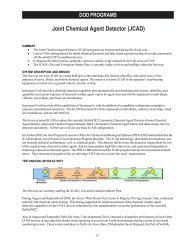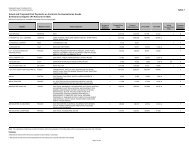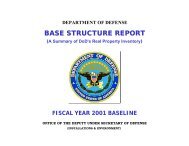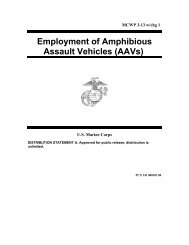report on programme manipulation - Independent Inquiry Committee
report on programme manipulation - Independent Inquiry Committee
report on programme manipulation - Independent Inquiry Committee
Create successful ePaper yourself
Turn your PDF publications into a flip-book with our unique Google optimized e-Paper software.
INDEPENDENT INQUIRY COMMITTEE INTO THE UNITED NATIONS OIL-FOR-FOOD PROGRAMME<br />
REPORT ON PROGRAMME MANIPULATION<br />
CHAPTER TWO<br />
OIL TRANSACTIONS AND ILLICIT PAYMENTS<br />
II.<br />
IMPLEMENTATION OF THE OIL-FOR-FOOD PROGRAMME<br />
Previous <strong>Committee</strong> <str<strong>on</strong>g>report</str<strong>on</strong>g>s have discussed the background to the introducti<strong>on</strong> of surcharges and<br />
the effect of the surcharges <strong>on</strong> the Iraqi oil market, together with the efficacy of measures taken<br />
by the United Nati<strong>on</strong>s to combat them. 9<br />
A. THE INITIAL PHASES<br />
Although the sale of crude oil was to be m<strong>on</strong>itored and approved by the 661 <strong>Committee</strong>, the Iraqi<br />
Ministry of Oil and its marketing arm, SOMO, were given the discreti<strong>on</strong> to choose its customers<br />
and the amount of oil to be sold to each <strong>on</strong>e. As an initial matter, SOMO c<strong>on</strong>tracted with oil<br />
companies without regard to the nati<strong>on</strong>ality of the owner or the locati<strong>on</strong> of their corporate base.<br />
According to an Iraqi official, when the Programme began, the Ministry of Oil was c<strong>on</strong>cerned<br />
about attracting customers given the risk associated with purchasing oil from a deteriorated Iraqi<br />
oil industry and under an untested United Nati<strong>on</strong>s program. During the first phase, Amer Rashid,<br />
then serving as Iraqi Minister of Oil, c<strong>on</strong>veyed to SOMO employees that he was anxious to sell<br />
oil to any company prepared to arrange for a vessel to load it. An American, Oscar Wyatt, was<br />
the first pers<strong>on</strong> who agreed to purchase oil. Mr. Wyatt arranged for a vessel to load the oil<br />
through his United States-based company, Coastal Petroleum Company. Other established oil<br />
companies followed suit, including: A.S. Tupras (Turkey), Alfa Eco (Russia), BP (United<br />
Kingdom), Chevr<strong>on</strong> Products Company (United States), Lukoil Petroleum Ltd. (Russia),<br />
Machinoimport (Russia), Repsol Petroleo S.A. (Spain), Shell (United Kingdom/Netherlands),<br />
SOCAP Internati<strong>on</strong>al (France), Total Internati<strong>on</strong>al Limited (France), and Zarubezhneft (Russia). 10<br />
B. THE POLITICIZATION OF OIL ALLOCATIONS<br />
As early as Phase II of the Programme, the Government of Iraq began directing oil allocati<strong>on</strong>s to<br />
particular countries and individuals. Iraqi officials took the positi<strong>on</strong> that it was within their<br />
discreti<strong>on</strong> to sell oil to countries “friendly to Iraq” and individuals perceived as being able to<br />
9 “Programme Management Report,” vol. II, pp. 32-34, 121-150.<br />
10 Ibid., vol. I, pp. 18, 27-28 (discussing oil sales under the Programme and the respective role of SOMO,<br />
the 661 <strong>Committee</strong>, and the oil overseers); SOMO allocati<strong>on</strong> table for Phase II (translated from Arabic);<br />
Iraq officials interviews. The SOMO Crude Oil Divisi<strong>on</strong> was resp<strong>on</strong>sible for selling oil and executing<br />
c<strong>on</strong>tracts with purchasers. During the Programme, the divisi<strong>on</strong> was divided into the Crude Oil<br />
Departments I, II, and III to deal with companies from different regi<strong>on</strong>s. SOMO sales c<strong>on</strong>tract no. M/01/01<br />
(Dec. 8, 1996) (c<strong>on</strong>tracting with Coastal Petroleum); <strong>Committee</strong> oil company table. Each phase lasted<br />
approximately six m<strong>on</strong>ths, and each year—starting in 1997—held two phases of the Programme. Thus<br />
Phase I started at approximately the end of 1996 and c<strong>on</strong>tinued until mid-1997, and Phase II started in mid-<br />
1997 and c<strong>on</strong>tinued until approximately the end of 1997. “Programme Management Report,” vol. I, pp. 18,<br />
27-28.<br />
REPORT ON PROGRAMME MANIPULATION–OCTOBER 27, 2005 PAGE 15 OF 623


